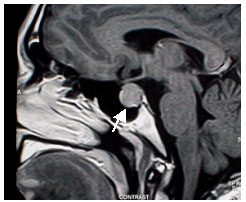Prolactin is a hormone secreted by the anterior pituitary gland which mainly plays a significant role in helping milk secretion in the postpartum period.
What causes prolactin levels to go high?
- Drugs like Metoclopromide, Chlorpromazine, anti-depressants like Amitriptyline & Fluoxitene
- Underactive thyroid gland
- Prolactinomas – Prolactin-producing tumour of the pituitary gland. Prolactinomas occur most commonly in those under 40 years old. They are rare in children. These tumors are about fives times as common in women as men. These tumors account for at least 30% of all pituitary adenomas
What are the symptoms ?
In Men In Women Decreased sexual interest Abnormal milk flow from the breast not related to nursing or childbirth (galactorrhea) Impotence Cessation of menses not related to menopause Infertility Infertility, Decreased sexual interest Headache/ visual changes Headache / visual changes
Large Prolactinoma
Large tumour, can cause pressure symptoms such as headache or visual problems. This is because the nerves to the eyes pass over the top of the pituitary gland. In a minority of patients, an increase in pituitary size may cause pressure on these nerves and produce visual disturbance.

What is the treatment for Prolactinoma?
These are the most important pituitary tumors as the can be managed without surgery.
- Most patients are treated with:
- Bromocriptine (two or three times a day)
- Cabergoline long acting and requires one or two doses per week
- Prolactin levels often fall to normal within a few weeks of starting the treatment. In women, once prolactin has fallen to normal, menstrual cycles usually resume and fertility is restored in most cases. In men, testosterone levels may rise to normal, which brings an improvement in sex life.
- Rarely surgery is required when the tumors are resistant to treatment.
- Side effects of Bromocriptine are dizziness, nausea, vomiting & constipation.